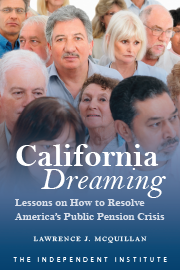Police killings of Alton Sterling in Baton Rouge, Louisiana, and Philando Castile in Falcon Heights, Minnesota, have ignited civil unrest and public debate. President Obama responded by asking law-enforcement agencies to adopt his 2015 Task Force recommendations, but more police bureaucracy is not the answer. Instead, citizens should be empowered to hire and fire the police officers who patrol their neighborhoods. Black Lives Matter should advocate for this.
More than a dozen high-profile police killings have occurred since 2009, including Oscar Grant, Michael Brown, and Freddie Grey. Politicians and police chiefs use these incidents to grow their budgets and add new bureaucratic programs.
After Eric Garner’s killing, NYPD Commissioner Bill Bratton announced: “There will be a re-training of every member of the New York City Police Department.” In response, the NYPD launched a $35 million “smart policing” campaign. The NYPD’s budget was increased 5.4 percent the fiscal year after Garner’s death.
The “budget ratchet effect” also occurred in Milwaukee after Dontre Hamilton was killed in 2014. The next fiscal year’s police budget increased 11.5 percent. In Cleveland, where 12-year-old Tamir Rice was killed in 2014, police-related spending, including spending on oversight boards and payments to the U.S. Department of Justice (DOJ), increased 11.6 percent the following year.
Chicago Mayor Rahm Emanuel implemented four new training programs recommended by the Task Force on Police Accountability in April 2016 in response to Laquan McDonald’s 2014 killing.
Mayor Ed Lee in San Francisco responded to Mario Woods’s 2016 killing with a $17.5 million program for “police reforms and violence prevention” to be implemented by 2018.
But do these re-training programs work? About 80 percent of the cops retrained in New York City called the three-day program “a waste of time,” with many falling asleep.
Two months before Philando Castile was shot in Falcon Heights by a St. Anthony police officer, then-Police Chief John Ohl boasted: “90 percent of what’s on that list (Obama’s Task Force list), we’re already doing.” Despite being Obama-compliant, the Castile killing occurred.
In 1999 Cleveland was investigated by the DOJ for aggressive use-of-force policies. In 2004 the city agreed to fix these issues with new training programs, among other things. But, beginning in 2013, the DOJ investigated Cleveland’s police department again for the same reason. Despite investigations and consent decrees, Tamir Rice was killed in 2014, and Cleveland is now increasing the police budget to pay for programs being added on top of past programs that failed.
Citizens deserve a better system that puts them in control.
Citizens, acting alone or coming together in their neighborhoods, should hire the police they feel comfortable with. Security vouchers would allow all income groups to participate. Citizens should also be able to fire quickly any officer or security company they’ve hired that is not performing adequately.
In Oakland, security guards at Whole Foods severely beat a customer in 2015. Within a day Whole Foods dismissed the guards and soon replaced Admiral Security Services with AGS Private Security. Private security companies must compete to provide the service and training that customers want or lose contracts and revenue. When government police departments fail, their budgets are increased.
In 2012 two private security guards killed 25-year-old Dante Price in Dayton, Ohio. They were immediately terminated and held personally liable, and are now serving four-year prison sentences. Summit Square Townhomes, where the killing took place, fired the private security firm, Ranger Security.
Private policing is true community policing because it puts citizens in control. Citizens would have to hire about the same number of police as the number of people who work in neighborhood grocery stores, a doable responsibility. Government policing, in contrast, puts bureaucrats in control. Only 2 percent of 28,000 misconduct complaints in Chicago between 2011 and 2015 resulted in disciplinary action. Yet the city has paid $662 million since 2004 for police misconduct, choosing to keep the bad apples and have taxpayers pay the settlements.
More money and power for police departments is not the answer. Citizens must take control over policing in their communities. This is what Black Lives Matter should advocate.










